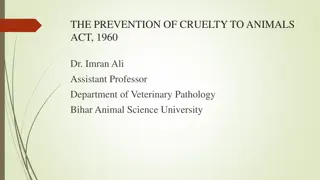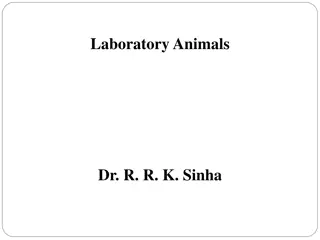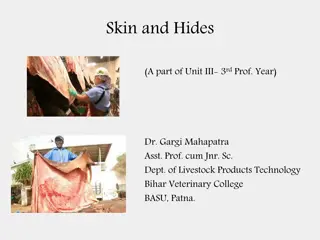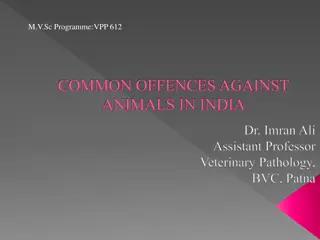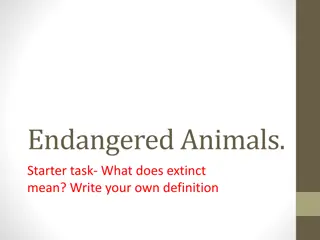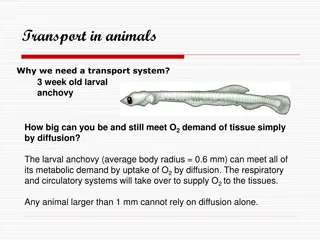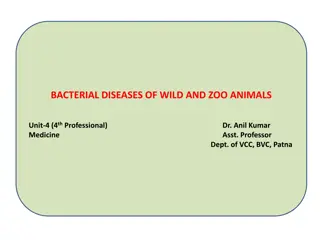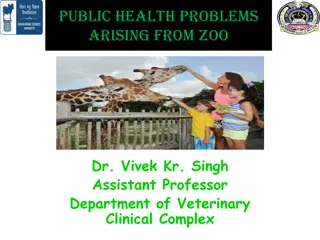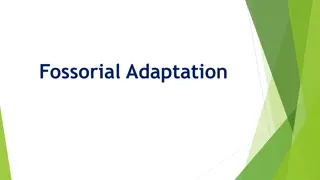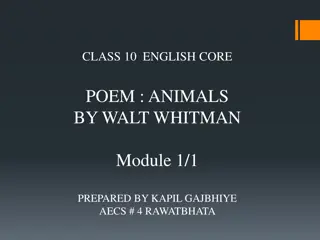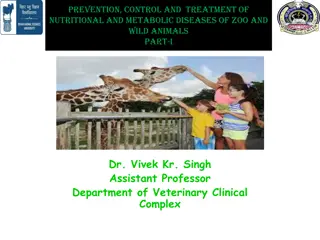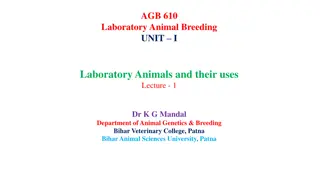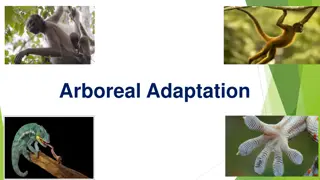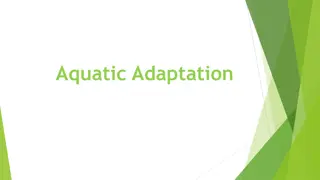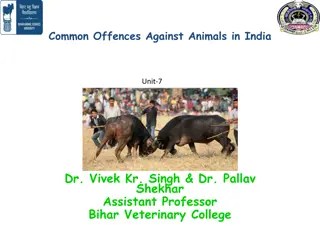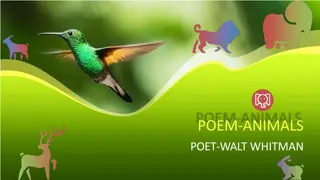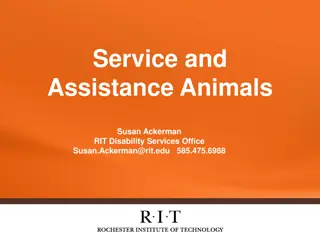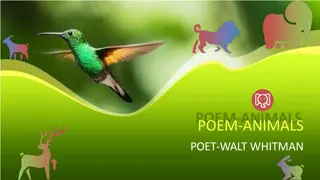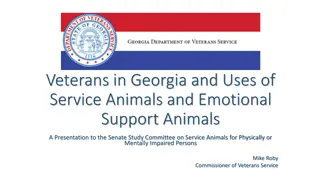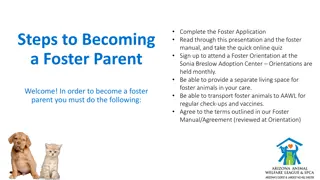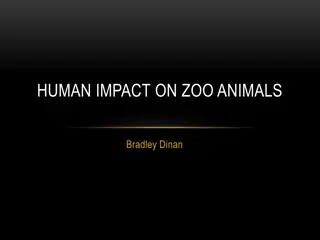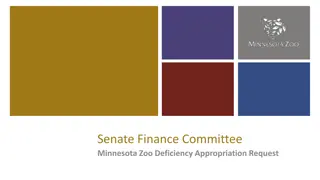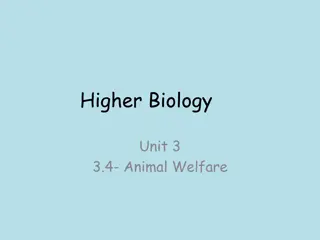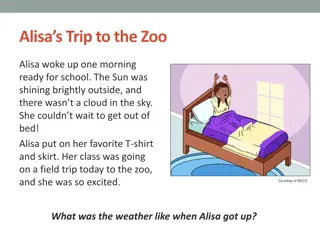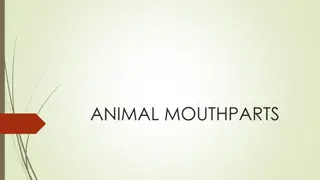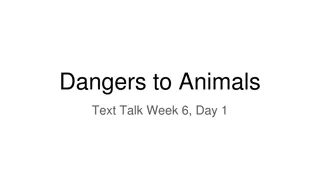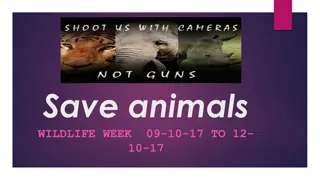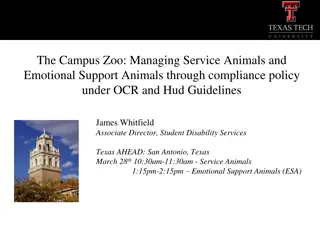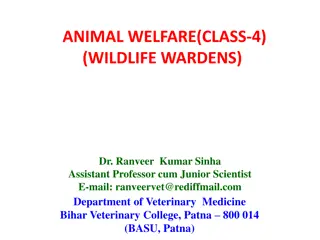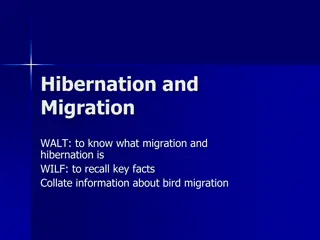The Prevention of Cruelty to Animals Act, 1960 Overview
The Prevention of Cruelty to Animals Act, 1960, is a legislation in India aimed at safeguarding the well-being of animals and preventing unnecessary pain or suffering. It defines important terms like animals, domestic animals, local authority, owner, and outlines the responsibilities of individuals
0 views • 16 slides
Understanding Laboratory Animals and Their Classification
Laboratory animals play a crucial role in scientific research due to their physiological similarity to humans. Common types include mice, rats, hamsters, guinea pigs, rabbits, and monkeys. They are classified into conventional and gnotobiotic animals based on their microbial status. Specific pathoge
1 views • 67 slides
Understanding the Importance of Skin and Hides in Livestock Industry
Skin and hides are crucial by-products of large and small animals, with differences in thickness and weight. They are sourced from slaughtered and fallen animals, processed through drying, tanning, and conditioning to produce leather. Leather has outstanding strength, flexibility, and weather insula
0 views • 16 slides
Common Offences Against Animals in India: Overview and Consequences
There are three common offences against animals in India: mischief, cruelty, and bestiality. Mischief involves killing, poisoning, or harming animals, punishable under IPC Sections 428 and 429. Cruelty includes acts like beating, overloading, and starvation, regulated by the Prevention of Cruelty to
0 views • 21 slides
Understanding Endangered Animals and Extinction
Explore the concept of endangered animals and extinction through tasks that involve listing endangered animals, understanding reasons for extinction, researching specific endangered species, and contemplating the ethical dilemma of keeping animals in zoos. Engage in critical thinking and research to
0 views • 8 slides
Importance of Transport System in Animals for Oxygen Supply
Animals require a transport system to meet tissue oxygen demands efficiently. The size limit for oxygen diffusion alone is around 1 mm due to the proportional increase in radius and diffusion properties. Blood is crucial for transporting oxygen, nutrients, waste products, cells, and heat, as well as
0 views • 17 slides
Bacterial Diseases Impacting Wild and Zoo Animals: An Overview
Learn about anthrax, tuberculosis, and salmonellosis, three significant bacterial diseases affecting wild and zoo animals. Understand their etiology, hosts, transmission, diagnosis, prevention, and treatment to safeguard animal populations effectively.
0 views • 11 slides
Understanding Public Health Risks Associated with Zoos and Wild Animals
Zoos and wildlife parks serve as hubs for public recreation and education but can also pose public health risks due to potential transmission of zoonotic diseases by veterinarians who work closely with wild animals. Approximately 61% of infectious agents affecting humans are zoonotic in nature, with
0 views • 15 slides
Understanding Fossorial Adaptation in Animals
Animals adapt to subterranean environments through anatomical and physiological modifications in a process known as fossorial adaptation. This adaptation involves creating subterranean zones through digging, leading to changes influenced by both the environment and the animals themselves. Fossorial
0 views • 17 slides
Animals by Walt Whitman: Embracing the Virtues of Animals Over Humans
Walt Whitman's poem "Animals" expresses a longing to live among animals due to their peaceful and self-controlled nature, contrasting them with the perceived greed and jealousy of humans. The poet finds solace in the virtues displayed by animals and reflects on their simplicity and contentment, high
0 views • 16 slides
Managing Nutritional and Metabolic Diseases in Zoo and Wild Animals
The prevention, control, and treatment of nutritional and metabolic diseases in zoo and wild animals are essential for maintaining their health. These diseases, such as rickets, osteoporosis, osteomalacia, and fibrous osteodystrophy, can result from imbalances in dietary nutrients and metabolic dera
0 views • 10 slides
Learn Plural and Singular Forms with Animals in English
This lesson focuses on differentiating between plural and singular forms using animals as examples. Students will learn to write sentences using "They're" for plural and "It's a" for singular, while looking at pictures of various animals. By the end of the lesson, students will be confident in using
1 views • 6 slides
Overview of Laboratory Animals and Their Uses in Biomedical Research
Laboratory animals play a crucial role in biomedical research, serving as models for studying various conditions affecting humans and animals. They must thrive in controlled conditions and are used to test hypotheses and drugs. Commonly used lab animals include rodents, lagomorphs, canines, felines,
0 views • 9 slides
Understanding Arboreal Adaptation in Animals
Arboreal locomotion refers to the movement through trees exhibited by animals like squirrels, sloths, and monkeys. These animals possess physical adaptations such as long limbs, prehensile tails, and claws to aid in tree climbing. Arboreal life offers safety, retreat, and easy access to food, shapin
0 views • 14 slides
Understanding Aquatic Adaptation in Animals
Aquatic adaptation refers to the changes in an animal's body organization to thrive in a water habitat. Vertebrates have evolved to lead partial or total aquatic lives, showcasing various adaptations. Water as a habitat offers a homogenous medium, stable conditions, and rich food resources. Aquatic
0 views • 9 slides
Common Offences Against Animals in India: Understanding Mischief, Cruelty, and Bestiality
Offences against animals in India encompass mischief, cruelty, and bestiality. Mischief involves killing, poisoning, and maiming animals, punishable under the IPC. Maiming makes animals permanently useless, often to harm owners. Cruelty includes beating, overloading, starvation, and other forms of a
0 views • 17 slides
Walt Whitman's Poem: Animals and Their Serenity
Walt Whitman's poem explores the tranquility and simplicity of animals compared to the complexities of human existence. He marvels at how animals do not dwell on dissatisfaction or material possession, finding solace in their self-sufficiency. Through vivid imagery and free verse, the poet reflects
0 views • 7 slides
Insights into Hibernation in Animals: Functions and Varieties
Hibernation is a fascinating biological phenomenon observed in various animals, enabling them to survive harsh conditions by conserving energy. This state of inactivity and metabolic depression is crucial for species like bears, pygmy possums, and bats during winter months. Animals hibernate to cope
0 views • 15 slides
Service and Assistance Animals Guidelines at RIT
Service and Assistance Animals Guidelines at RIT provide information on the definition of service and assistance animals, request procedures, expectations of animal and owner, and how to address concerns. The policy distinguishes between service animals trained to perform tasks for individuals with
0 views • 15 slides
Insights into Walt Whitman's Poem "Animals": A Journey of Self-Discovery
Walt Whitman's poem "Animals" delves into the poet's contemplation of living with animals for their peaceful and self-contained nature compared to complex human interactions. Through vivid imagery and free verse, Whitman expresses admiration for animals' contentment, lack of materialistic desires, a
4 views • 7 slides
Learn About Animals Through This Interactive PowerPoint Presentation
Explore the fascinating world of animals in this interactive PowerPoint presentation. Discover the six groups of animals categorized in unique classes with fun facts and engaging visuals. You'll get to learn about mammals, birds, and more while filling in blanks and pasting pictures of different ani
0 views • 29 slides
The Zoo Pet Adventure: A Tale of Finding the Perfect Companion
Join in the fun as a young girl writes to the zoo requesting a pet, only to receive a series of unique animals that don't quite fit the bill. Each animal sent back until the zoo finally gets it right with a perfect puppy. This charming story by Rod Campbell is a delightful exploration of finding the
0 views • 14 slides
Service Animals for Veterans in Georgia: A Guide to VA Guidance
Veterans in Georgia can benefit from service animals, including guide dogs and trained service animals, to assist with physical or mental impairments. The VA provides guidelines for evaluating, approving, and supporting veterans in receiving and caring for service animals. This includes information
0 views • 8 slides
Become a Foster Parent for AAWL: Steps and Requirements
Join the Arizona Animal Welfare League's Foster Care Program by following the steps outlined: complete the application, attend orientation, and provide a separate living space and transportation for foster animals. Learn why fostering young animals is crucial and the guidelines for integrating them
0 views • 14 slides
Understanding Food Sources: Plants and Animals Explained
Food is essential for nourishing our bodies, and it comes from either plants or animals. Plants provide fruits, vegetables, grains, and more, while animals offer products like meat, milk, and eggs. Different parts of plants, such as roots, stems, and leaves, are consumed as food. Animals have varied
0 views • 11 slides
Exploring Humorous Techniques in Carolyn Wells' Poem on Wild Animals
The poem by Carolyn Wells humorously depicts the characteristics of wild animals, treating even ferocious beasts with a coat of gentle but weird humor. Through witty language and ironic twists, the poetess describes the different wild animals and their dangerous behaviors, highlighting the risks of
0 views • 12 slides
Enhancing Zoo Animal Welfare: Practical Strategies for Positive Human Impact
Implementing one-way glass in zoo exhibits, feeding animals in various areas daily, and increasing exhibit sizes can improve the welfare of zoo animals. These practices promote natural behaviors, autonomy, and well-being, aiming to create environments that mimic the wild while prioritizing animal ne
0 views • 5 slides
Minnesota Zoo Financial Challenges and Action Plan
Minnesota Zoo is facing financial difficulties as expenses are projected to surpass revenues by $1.5 million in FY15. With only 22% of its budget covered by the state's general fund appropriation, the zoo is seeking additional support to stabilize its finances. Various factors such as attendance sho
1 views • 8 slides
Understanding Animal Welfare and Five Freedoms in Farming
Animal welfare encompasses physical and mental wellbeing, allowing animals to express natural behaviors. The Five Freedoms outline essential welfare needs, making sure animals are free from hunger, discomfort, pain, fear, and distress. The Farm Animal Welfare Council ensures these needs are met for
0 views • 16 slides
Alisa's Zoo Field Trip Weather Adventure
Alisa's exciting zoo field trip gets impacted by changing weather conditions – from a sunny morning to gusts of wind, cooler temperatures, and finally, rain on the way back to school. Alisa adapts to the changing weather with her classmates, experiencing shifts in temperature and weather patterns
0 views • 7 slides
Evolutionary Adaptations in Animals and Their Mouthparts
Environmental conditions have influenced the evolution of animals, leading to adaptations that allow them to survive and thrive. One crucial aspect is the relationship between animals, their environment, and food sources, shaping physical traits like mouthparts for efficient feeding. Explore how dif
0 views • 9 slides
Understanding Dangers to Animals: Predators and Habitat Loss
Animals face various dangers in their natural habitats, including predators and habitat loss. Predators like owls, bobcats, and racoons hunt other animals, while habitat loss, such as the melting Arctic ice cap, threatens species like polar bears. Human activities, like beach development, also impac
0 views • 19 slides
Save Animals - Wildlife Week Awareness Campaign
Explore the importance of animals in nature and the cruel acts of killing them for various purposes. Learn how we can protect and respect animals to prevent extinction. Take a stand against harming animals for selfish needs.
0 views • 18 slides
Chaperone Guidelines and Responsibilities for Jacksonville Zoo Field Trip
Chaperones for the upcoming Jacksonville Zoo field trip are advised to adhere to guidelines including arriving early, supervising students on the bus, ensuring safety, and more. Younger siblings are not allowed, and students are responsible for their own belongings. Chaperones must be 18 or older an
0 views • 26 slides
Fun at the Zoo - Interactive Learning Experience with Julia Pichugina
Explore the zoo through engaging images and interactive activities created by Julia Pichugina. From birds to elephants, fish, gorillas, and buffalos, discover the world of animals. Test your knowledge with questions and enjoy reading exercises. Give feedback and have fun learning with this dynamic e
0 views • 13 slides
Controversies Surrounding Zoos and Aquariums: An In-depth Look
Explore the complex issues surrounding zoos and aquariums, from animal attacks to ethical concerns. Controversies include killer whale incidents at SeaWorld, exotic pet statistics, zoo accidents, living conditions for animals, and arguments for and against keeping zoos open. The article delves into
0 views • 9 slides
Learn Where Different Animals Live - Educational English Lesson for Class Two Students
In this engaging English lesson designed for Class Two students, they will explore where animals live through visual aids and interactive learning activities. The lesson covers various animals like birds, snakes, cows, tigers, and more, teaching students about their habitats in a fun and educational
0 views • 22 slides
Managing Service Animals and Emotional Support Animals in Compliance with ADA and HUD Guidelines
This presentation by James Whitfield explores the management of service animals and emotional support animals on campus under OCR and HUD guidelines. The session covers defining service animals, identifying them in training, recognizing emotional support animals, and understanding the distinctions b
1 views • 52 slides
Wildlife Warden Duties and Performing Animals Welfare Guidelines
Every state and union territory in India has a Wildlife Advisory Board to aid in wildlife protection, with Wildlife Wardens playing a key role in conservation efforts. They focus on preventing poaching, protecting wildlife habitats, and engaging with local communities. Additionally, guidelines are s
0 views • 8 slides
Understanding Migration and Hibernation in Animals
Explore the fascinating behaviors of birds during migration and animals during hibernation. Discover how animals adapt to survive in changing environments, the reasons behind hibernation, dangers involved, and how different animals prepare for winter. Learn about light sleepers that are not true hib
0 views • 17 slides
